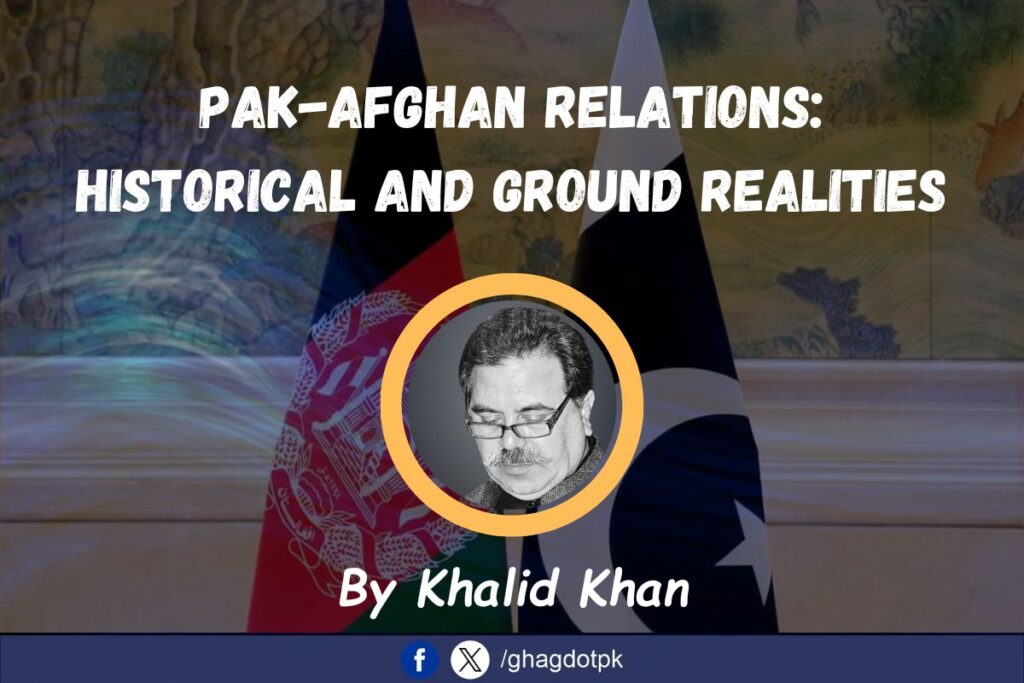By Khalid Khan
Historically, Afghanistan has been a complex issue for this region, and this will remain the case until we acknowledge its historical and ground realities. From its inception to the present day, two fundamental issues have persisted. First, Afghanistan has been artificially presented as a nation-state, despite never being a unified entity with a common religion, ethnicity, or shared history. The second tragedy is that Afghanistan has never been under the rule of a single, central authority. While control of Kabul was often considered as the conquest of Afghanistan, the Pashtun-majority regions, especially those far from Kabul, maintained a separate and independent status, even when they were nominally under Kabul’s rule. This fragmentation has prevented the establishment of stable governance in the country.
Despite the presence of a central government, global and regional powers have continued to exert influence. The Pashtun population in Afghanistan has often played the role of mercenary soldiers for various powers, while the non-Pashtun populations have aligned with Central Asian and Western forces, driven by sectarian, historical, and survival motives. Throughout its history, Afghanistan has never witnessed a nationalist movement or the flourishing of democratic ideals. The country has never produced a leader capable of shaping public opinion or building a unified vision for the people.
Afghanistan’s economy has historically relied on war, and it has often been the source of instability for the Indian subcontinent. The repeated invasions from Afghanistan into a peaceful, civilized Indian society are still justified today by religious and national arguments, further muddling historical and ground realities. Unfortunately, this same mistake is still being repeated by both the international community and Pakistani institutions, which are often considered experts on Afghan affairs. Constant errors in Afghan policies continue to shape current strategies.
India, however, has successfully implemented its Afghan policy, achieving its national goals and securing objectives that its establishment had envisioned. India’s strategy in Afghanistan has multifaceted goals, with the primary aim of keeping Pakistan’s western border destabilized. This keeps Pakistan’s military, financial, and human resources preoccupied with the western frontier, allowing peace to prevail along its eastern border and in occupied Kashmir. Furthermore, India’s strategy has focused on hindering China’s access to warm waters, forcing Russia to engage in bilateral trade with Iran, and ensuring internal divisions within Pakistan.
India has also invested heavily in fostering separatist, pro-democracy, and liberal voices within Pakistan, to exacerbate political instability. Due to sectarian divisions and political strife within Pakistan, India and other hostile forces have succeeded in aligning Pakistan and Afghanistan against each other. Border infiltrations have fueled further tensions, and peaceful relations between Afghanistan and Pakistan have become more crucial than ever, not just for the two nations but for the broader region and global peace and prosperity.
India’s resentment towards Afghanistan’s past subjugation continues, but Afghan governments and fragmented non-political groups either fail to understand this or sacrifice national interest for personal gain. On the other hand, Pakistan’s establishment mistakenly views independent voices as adversaries and seeks to silence them. For a long time, Pakistan maintained the stance that a Pashtun-led Taliban government would serve its interests by preventing Afghanistan from becoming a base for anti-Pakistan forces. However, this approach ignored the fact that while Islam rejects nationalism, it also promotes the idea of the “Ummah,” which in the current context is unrealistic. The dream of a united Muslim world undermines the existence of independent Muslim states.
India’s strategy has been to keep Afghanistan destabilized so that it never becomes a threat by leading the “Khorasani Army” to wave the Islamic flag over Delhi’s Red Fort. India has achieved its objectives, while Pakistan must reassess its Afghan policy. The international powers, led by the West and the US, will never allow a stable or democratic government to flourish in Afghanistan. They will continue to keep the country unstable through various Islamic groups and militant organizations rather than offering economic access to Central Asia, Russia, or China.
Afghanistan cannot afford direct conflict with Pakistan; however, the Taliban can provide vital support to terrorist groups operating against Pakistan. Afghanistan continues to provide safe havens, training, financial resources, modern weapons, and ideological guidance to these groups. Pakistan has raised these issues with Afghanistan multiple times, but the Taliban has consistently denied the evidence. Recently, Pakistan targeted three key terrorist centers, including one that trained suicide bombers and operated “Omar Media Services.” Over 60 militants were killed in the operation, with civilian casualties being avoided. The Taliban, however, accused Pakistan of attacking refugee camps and launched a propaganda campaign to falsely portray the operation as a humanitarian violation, using fabricated images and stories of innocent children.
The truth is that these centers housed terrorists and their families, and the deaths that occurred were not unusual. Instead of continuing with an apologetic stance, Pakistan must adopt a firm position. The Taliban is now isolated globally, and it is inconceivable for them to be recognized without Pakistan’s support. Pakistan must engage with Afghanistan as a neighboring country, restrain the Taliban, and recognize the Durand Line as an internationally accepted border. Relations should be conditioned on the Taliban’s behavior, and Pakistan must prioritize its national interests, sovereignty, and territorial integrity, even if it requires political changes.






